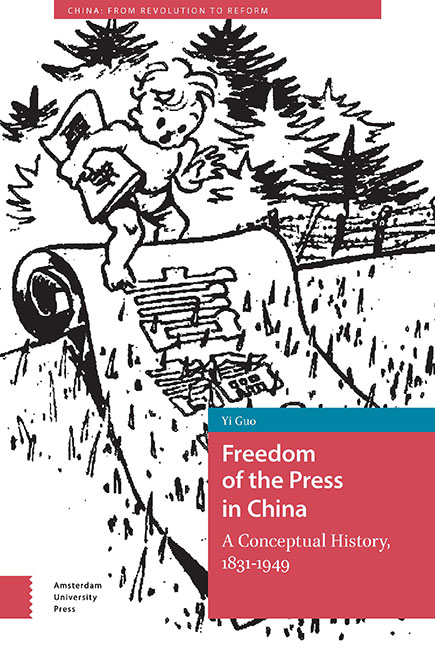Book contents
- Frontmater
- Contents
- A Note on Romanization
- Acknowledgements
- Foreword
- Introduction
- 1 The Enlightenment of the West
- 2 Chuban Ziyou: The Invention of a Neologism
- 3 The Liminal Landscape
- 4 The Intellectual Legacy of Sun Yat-sen
- 5 The Empty Phrase and Popular Ignorance
- 6 Conceptual Debates in the 1920s and 1930s
- 7 The Last Call for Press Freedom
- Conclusion
- Bibliography
- Index
7 - The Last Call for Press Freedom
Published online by Cambridge University Press: 20 November 2020
- Frontmater
- Contents
- A Note on Romanization
- Acknowledgements
- Foreword
- Introduction
- 1 The Enlightenment of the West
- 2 Chuban Ziyou: The Invention of a Neologism
- 3 The Liminal Landscape
- 4 The Intellectual Legacy of Sun Yat-sen
- 5 The Empty Phrase and Popular Ignorance
- 6 Conceptual Debates in the 1920s and 1930s
- 7 The Last Call for Press Freedom
- Conclusion
- Bibliography
- Index
Summary
Abstract
In the final years of the 1940s, China was to have its last chance to realize press freedom. This chapter builds on Chapter 6, exploring the calls for press freedom that emerged in the 1940s and that echoed changes in the domestic and international situation. These calls were aimed at achieving proponents’ own political interests rather than the ideal of press freedom as a human right in itself. The motivations behind the Chinese Communist Party's advocacy of press freedom during those years are explored as well as the fears that made many Nationalists wary of a truly free press. ‘Freedom of the press’ had become an instrumental concept used for political purposes, where a free press was not the intended outcome.
Keywords: Nationalist Party, Kuomintang, Chinese Communist Party, constitutional movement, Chiang Kai-shek, civil rights
In June 1929, the Nationalist Party promised that Political Tutelage would only last for a six-year period, after which a constitutional government would be formally established in 1935. This promise was not kept. Faced with intractable military and political crises both internationally and domestically, the the Nationalist Party did not proceed with the transition from Political Tutelage to constitutional democracy. Before addressing the constitution, the Nationalist Party felt there were other issues that were more critical, such as the resistance war against Japan, the continuing political and military conflicts amongst the different factions and cliques within the Nationalist Party, and the ‘encirclement and suppression’ campaign they were running against the Communist troops. After the end of the Second World War, Chiang Kai-shek still insisted on a military dictatorship and refused to implement constitutional democracy until the armed forces of the Communist Party had been entirely dismantled. In this context, many non- Nationalist intellectuals, and particularly those from the opposition parties, increased their calls for constitutional democracy, urging the Nationalist Party to honour its earlier commitment. During this movement of striving for constitutional democracy, fighting for a free press became an important agenda for these intellectuals.
The Constitutional Movement and Democratic Propositions
Even though calls to move towards constitutional democracy and press freedom had emerged as early as the late 1930s, it was not until the 1940s that they became more vocal.
- Type
- Chapter
- Information
- Freedom of the Press in ChinaA Conceptual History, 1831–1949, pp. 191 - 210Publisher: Amsterdam University PressPrint publication year: 2020



